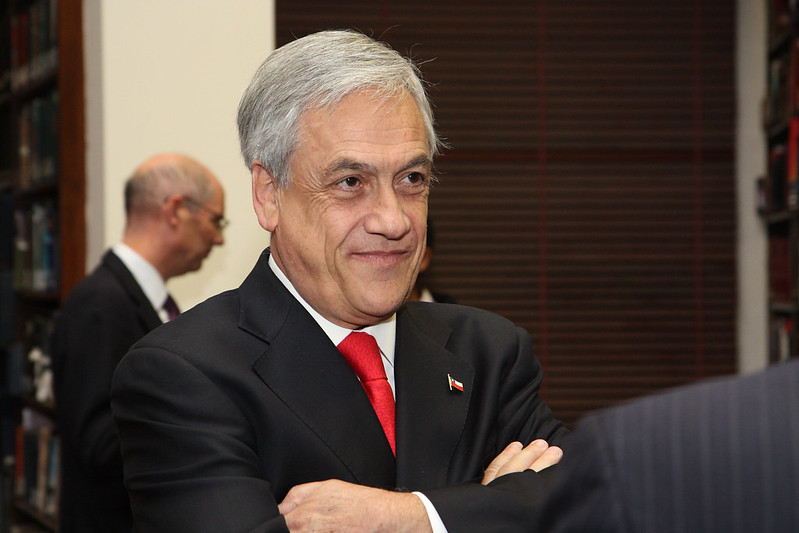Chile’s government announced it would deliver $24 billion in state-guaranteed loans through the financial system to save companies at risk of bankruptcy due to the Covid-19 quarantine. Thanks to their political connections, banks will once again receive public support with no strings attached.

“In Chile, it is the banks that decide the direction of politics,” said the Chilean liberal lawyer and politician Alfredo Irarrázaval in 1901.
“That is the prevailing system in Chile, then. I want to see you asking for more power to manage the banks and see what they tell you,” ex-President Ricardo Lagos echoed 111 years later.
Today, once again banks are receiving the key to power. Chile’s government announced it would deliver state-guaranteed loans worth $24 billion through the financial system to save companies at risk of bankruptcy due to the coronavirus quarantine. The loans, according to the law approved by the Chilean Congress today (Thursday), will cap the loans at 3.5 percent interest.
The conditions are a paradise for banks: The Central Bank gives them money at an interest of 0.5 percent, the Treasury guarantees between 60 percent and 85 percent of the loans, and the authorities also eliminate several regulations to give banks more freedom. In exchange for what?
Chile’s former superintendent of pensions, Álvaro Gallegos, warns that “for all these direct benefits to its assets, the bank does not pay any cost or assume any social obligation in return.” The country’s economy minister acknowledges: “The ball is now in their hands.”
Well, recent history provides some lessons on how banks are playing on an empty court.
In 2000 and 2001, Chile’s central bank sharply reduced interest rates to revive the country’s economy following the Asian financial crisis. But in many cases, instead of passing those reduced interest rates to their clients, the banks increased their margins. This increase, according to University of Chile economist Eduardo Engel, led to “more than one analyst accusing them of colluding.”
In 2011, the Superintendency of Banks (SBIF), the regulatory agency in charge of supervising banks in Chile, calculated that these entities transferred just 20 percent of their interest losses to clients who took out consumer loans. “There is no reasonable explanation,” said the former president of the country’s central bank, José de Gregorio.
As for the tax guarantee, we in Chile have some experience with state-guaranteed credit: 2005’s notorious Crédito con Aval del Estado (“CAE”), which aimed to deliver credit to university students with financial difficulties. Patricio Meller, an academic, calculates that the CAE gave the banks a return of UF [Unidad de Fomento, a unit of account used in Chile] + 18 percent “for an investment with virtually no risk.” As former President Lagos admitted years later, “There was surely collusion between banks and they charged 6 percent with the guarantee of the state. That cannot be.”
The situation became so absurd that in 2009, it would have been cheaper for the state to pay the students’ reference fee directly [“Reference fee” is a type of financial aid unique to Chile’s higher education system, in which the CAE covers a part of students’ tuition, depending on its cost], instead of leaving them indebted to the bank. But the state could not do it: The CAE law prohibited such an intervention.
The state tied its own hands in its treatment of the banks, and “currently bidders know that the government must sell all loans at a single auction in a short time period. This knowledge gives a measure of price leverage, as any buyer has when negotiating with a seller who must sell,” a World Bank report later stated.
The current crisis doesn’t provide us with much cause for optimism either.

In 2019 alone, banks in Chile earned $3.4 billion—16 times what the state is spending on the stimulus for part-time workers affected by the crisis. Despite these fabulous profits, a similar request from the authorities (to reduce the distribution of dividends to a minimum of 30 percent) has only been accepted by four banks. The rest continue with their plans to give their shareholders figures that reach 100 percent of profits, in the midst of the worst economic crisis in a century.
This week, a government spokesperson recalled that “at some point, the banks required state aid.” In 1983, the Treasury (that is, the money of all Chileans) rescued the banks to avoid the collapse of the financial system. Banks had sunk the economy with irresponsible and, in some cases, criminal practices. Millions of Chileans were drowning under 25 percent unemployment, Pinochet-era government programs that instituted under-employment and low salaries, and a blow of 10.6 percent to retirees’ pensions.
The banks, however, received a lifeline full of crossed interests between authorities and bankers: The secretary who intervened in the bailout had previously been director of Banco de Chile.
Banks were not supposed to distribute profits to their shareholders until they had paid the entire amount of that “subordinated debt” to the state. But a comprehensive series of laws, resolutions, and rulings—even by the Constitutional Court—allowed banks to make a profit long before paying their debts (Banco de Chile only finished paying its debt in 2019, 36 years after the fact).
The Minister of Finance insists that in this emergency plan, “there is no profit, other than the business of the banks.” But the former Superintendent of Banks during the first Piñera government, Raphael Bergoeing, warns that “no public policy can be based on the goodwill of private actors who maximize their profits.”
This time, by the way, the banking sector is not to blame for the crisis. On the contrary, banks have a great historical opportunity to be part of the solution. Will they do so? Or will we witness once again how “the prevailing system” works in Chile?






